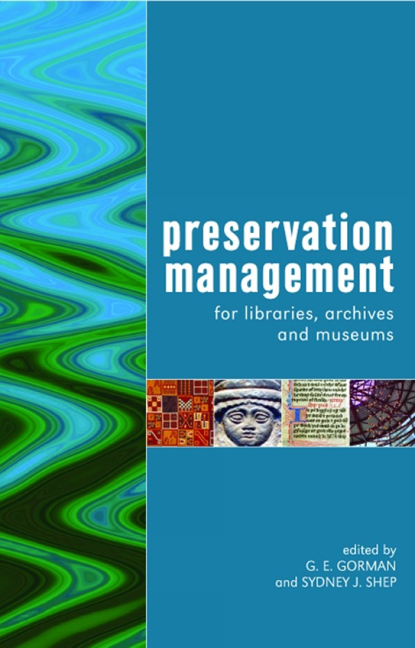Book contents
- Frontmatter
- Contents
- About the contributors
- Introduction
- 1 Managing the documentary heritage: issues for the present and future
- 2 Preservation policy and planning
- 3 Intangible heritage: museums and preservation
- 4 Surrogacy and the artefact
- 5 Moving with the times in search of permanence
- 6 Valuation model for paper conservation research: a new approach for setting research priorities
- 7 Preservation of audiovisual media: traditional to interactive formats
- 8 Challenges of managing the digitally born artefact
- 9 Preserving cultural heritage in times of conflict
- 10 Access and the social contract in memory institutions
- 11 Redefining ‘the collection’ in the 21st century
- Index
1 - Managing the documentary heritage: issues for the present and future
Published online by Cambridge University Press: 08 June 2018
- Frontmatter
- Contents
- About the contributors
- Introduction
- 1 Managing the documentary heritage: issues for the present and future
- 2 Preservation policy and planning
- 3 Intangible heritage: museums and preservation
- 4 Surrogacy and the artefact
- 5 Moving with the times in search of permanence
- 6 Valuation model for paper conservation research: a new approach for setting research priorities
- 7 Preservation of audiovisual media: traditional to interactive formats
- 8 Challenges of managing the digitally born artefact
- 9 Preserving cultural heritage in times of conflict
- 10 Access and the social contract in memory institutions
- 11 Redefining ‘the collection’ in the 21st century
- Index
Summary
Introduction
The preservation of the documentary heritage has to be seen in the broader context of managing what we have inherited from the past in a way which will allow us to hand it on to the future. Documentary preservation makes sense only when we also take account of the preservation of objects, the built environment and created landscapes. But we cannot preserve everything, and indeed should not seek to do so. As a society needs and desires change, the political and social expression of its understanding of, and need for, its inheritance also changes. In responding to change, each generation makes its own contribution to the heritage of the future. How we decide what must be preserved, and how we then preserve it in a meaningful way, is the question which lies at the heart of preservation management. This chapter explores these complex themes as an introduction to the more detailed studies which follow, and in this sense serves as an overview to the entire volume.
Heritage and culture
Heritage has become a growth industry (Ashworth and Larkham, 1994; Lowenthal, 1998). A combination of cultural tourism at a time of cheap and easy travel, and nostalgia at a time of profound social change, has made heritage a part of the leisure industries. In itself this is not new. The 18th century grand tourists, who were the distant ancestors of the customers of easyJet, were a cultural and economic elite. If the democratization of wealth and education has not quite made Venice, Agra and Bangkok into destinations accessible to everyone, it has certainly opened up horizons – both geographical and intellectual – which were inconceivable in earlier times. Yet as international travel has become more available to more people than ever before, there has also been a growing sense of the national dimension of heritage.
A large part of the contents of the museums, galleries and libraries of Europe and North America has been removed from its place of origin. Some of that removal was a result of the spoils of war; some was simple theft; some was by agreement between equal parties; and some, of course, was by entirely legitimate commercial transactions entered into freely by consenting buyers and vendors.
- Type
- Chapter
- Information
- Publisher: FacetPrint publication year: 2006
- 12
- Cited by



